University Public Law Assignment: Parliamentary Sovereignty and Acts
VerifiedAdded on 2022/08/20
|10
|2001
|20
Homework Assignment
AI Summary
This public law assignment addresses the effectiveness of several imaginary pieces of primary legislation recently passed by the UK Parliament. The assignment analyzes the validity of an Act abolishing university tuition fees, considering the implications of a prior Act and the Universities Board of Governors' concerns. It examines the Dangerous Dogs Act 2018, which was passed without the required two-thirds majority. The assignment also explores the Human Rights (Exit) Act 2018, which abolishes the Human Rights Act 2008. The assignment further discusses the British Jobs Act 2018 and the Royal Assent in relation to the Fox Hunting Act 2019, referencing relevant legal principles such as implied repeal, parliamentary sovereignty, and the role of the Royal Assent. The assignment also includes a bibliography of case laws, journals, scholars, and websites.
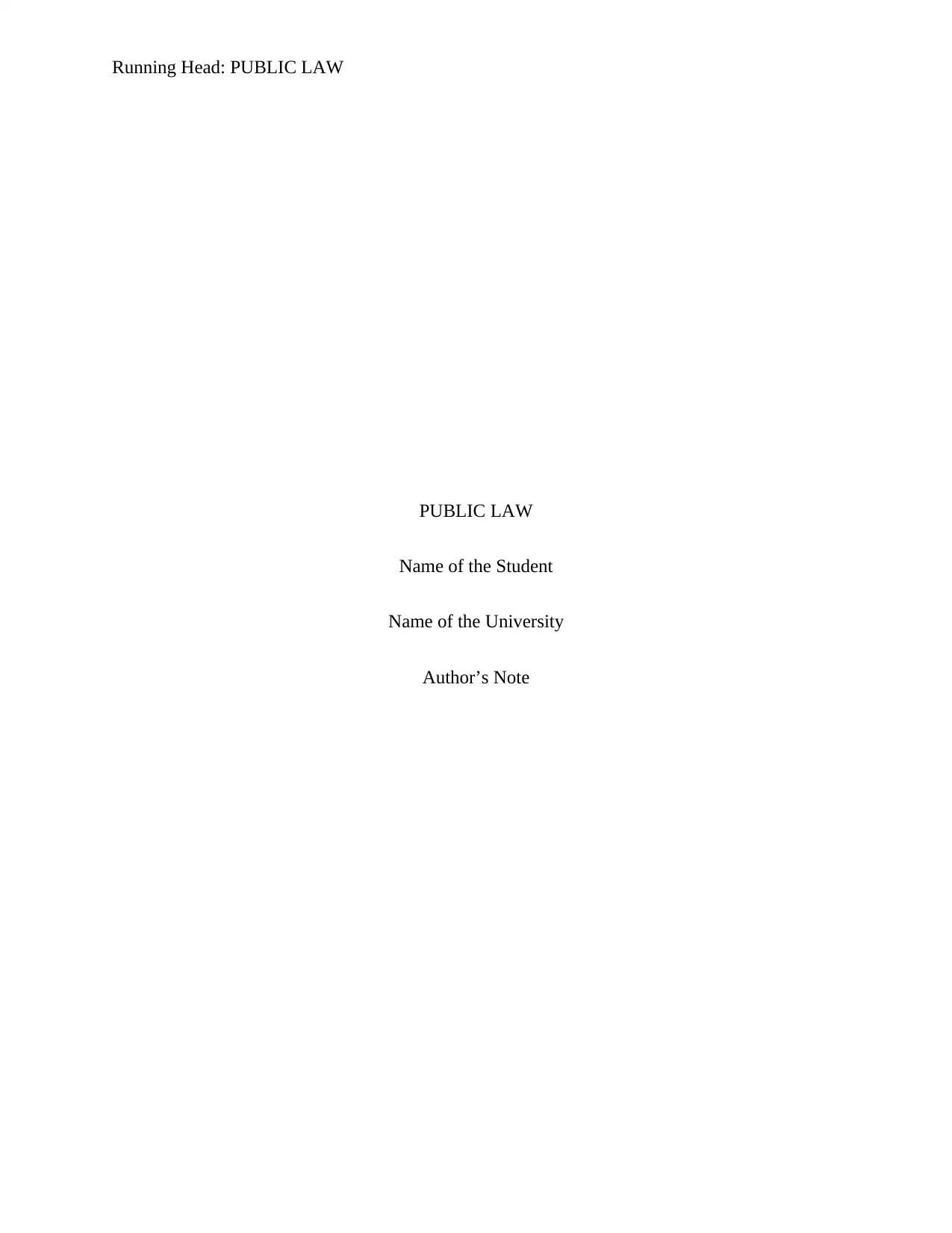
Running Head: PUBLIC LAW
PUBLIC LAW
Name of the Student
Name of the University
Author’s Note
PUBLIC LAW
Name of the Student
Name of the University
Author’s Note
Paraphrase This Document
Need a fresh take? Get an instant paraphrase of this document with our AI Paraphraser
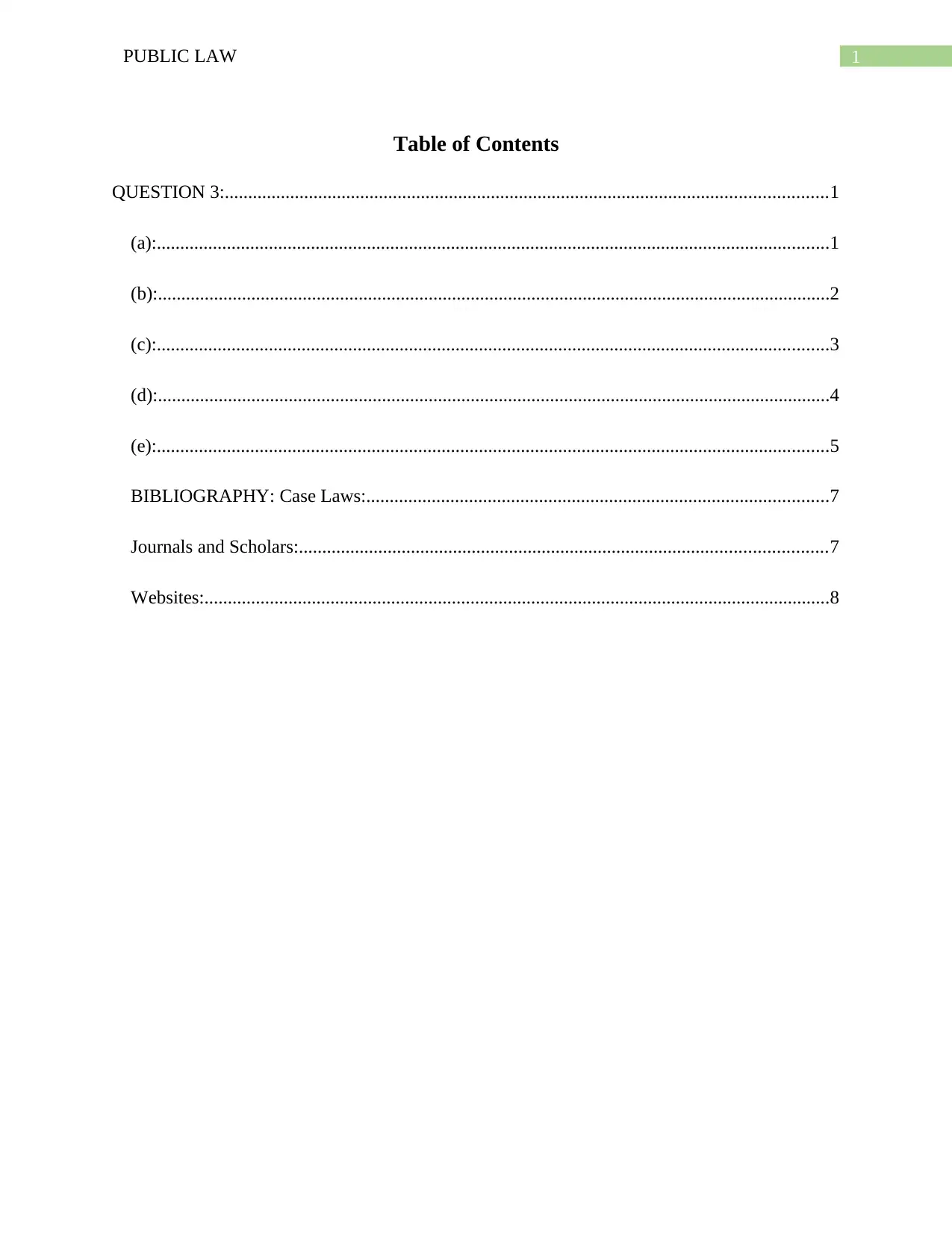
1PUBLIC LAW
Table of Contents
QUESTION 3:.................................................................................................................................1
(a):................................................................................................................................................1
(b):................................................................................................................................................2
(c):................................................................................................................................................3
(d):................................................................................................................................................4
(e):................................................................................................................................................5
BIBLIOGRAPHY: Case Laws:...................................................................................................7
Journals and Scholars:.................................................................................................................7
Websites:......................................................................................................................................8
Table of Contents
QUESTION 3:.................................................................................................................................1
(a):................................................................................................................................................1
(b):................................................................................................................................................2
(c):................................................................................................................................................3
(d):................................................................................................................................................4
(e):................................................................................................................................................5
BIBLIOGRAPHY: Case Laws:...................................................................................................7
Journals and Scholars:.................................................................................................................7
Websites:......................................................................................................................................8
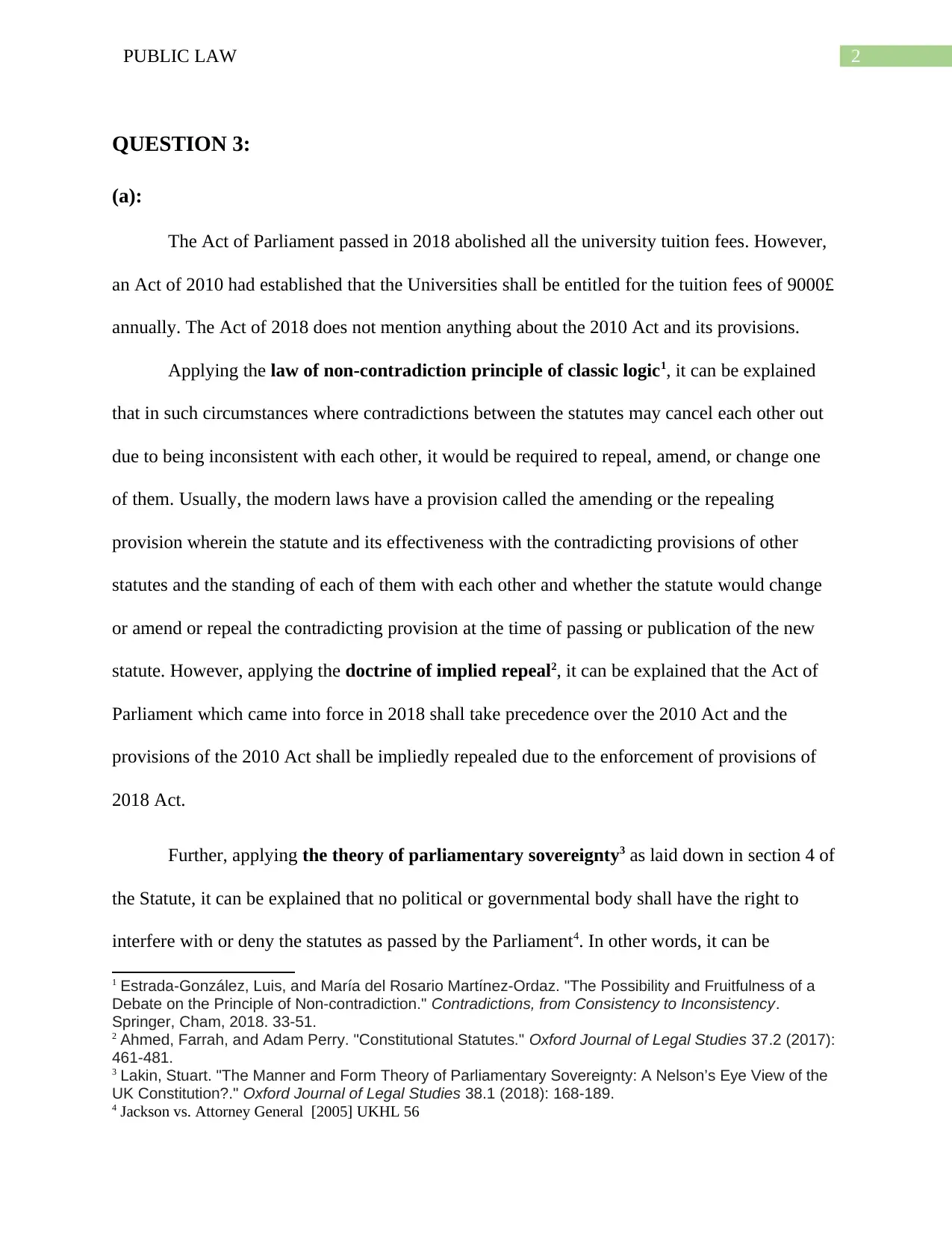
2PUBLIC LAW
QUESTION 3:
(a):
The Act of Parliament passed in 2018 abolished all the university tuition fees. However,
an Act of 2010 had established that the Universities shall be entitled for the tuition fees of 9000£
annually. The Act of 2018 does not mention anything about the 2010 Act and its provisions.
Applying the law of non-contradiction principle of classic logic1, it can be explained
that in such circumstances where contradictions between the statutes may cancel each other out
due to being inconsistent with each other, it would be required to repeal, amend, or change one
of them. Usually, the modern laws have a provision called the amending or the repealing
provision wherein the statute and its effectiveness with the contradicting provisions of other
statutes and the standing of each of them with each other and whether the statute would change
or amend or repeal the contradicting provision at the time of passing or publication of the new
statute. However, applying the doctrine of implied repeal2, it can be explained that the Act of
Parliament which came into force in 2018 shall take precedence over the 2010 Act and the
provisions of the 2010 Act shall be impliedly repealed due to the enforcement of provisions of
2018 Act.
Further, applying the theory of parliamentary sovereignty3 as laid down in section 4 of
the Statute, it can be explained that no political or governmental body shall have the right to
interfere with or deny the statutes as passed by the Parliament4. In other words, it can be
1 Estrada-González, Luis, and María del Rosario Martínez-Ordaz. "The Possibility and Fruitfulness of a
Debate on the Principle of Non-contradiction." Contradictions, from Consistency to Inconsistency.
Springer, Cham, 2018. 33-51.
2 Ahmed, Farrah, and Adam Perry. "Constitutional Statutes." Oxford Journal of Legal Studies 37.2 (2017):
461-481.
3 Lakin, Stuart. "The Manner and Form Theory of Parliamentary Sovereignty: A Nelson’s Eye View of the
UK Constitution?." Oxford Journal of Legal Studies 38.1 (2018): 168-189.
4 Jackson vs. Attorney General [2005] UKHL 56
QUESTION 3:
(a):
The Act of Parliament passed in 2018 abolished all the university tuition fees. However,
an Act of 2010 had established that the Universities shall be entitled for the tuition fees of 9000£
annually. The Act of 2018 does not mention anything about the 2010 Act and its provisions.
Applying the law of non-contradiction principle of classic logic1, it can be explained
that in such circumstances where contradictions between the statutes may cancel each other out
due to being inconsistent with each other, it would be required to repeal, amend, or change one
of them. Usually, the modern laws have a provision called the amending or the repealing
provision wherein the statute and its effectiveness with the contradicting provisions of other
statutes and the standing of each of them with each other and whether the statute would change
or amend or repeal the contradicting provision at the time of passing or publication of the new
statute. However, applying the doctrine of implied repeal2, it can be explained that the Act of
Parliament which came into force in 2018 shall take precedence over the 2010 Act and the
provisions of the 2010 Act shall be impliedly repealed due to the enforcement of provisions of
2018 Act.
Further, applying the theory of parliamentary sovereignty3 as laid down in section 4 of
the Statute, it can be explained that no political or governmental body shall have the right to
interfere with or deny the statutes as passed by the Parliament4. In other words, it can be
1 Estrada-González, Luis, and María del Rosario Martínez-Ordaz. "The Possibility and Fruitfulness of a
Debate on the Principle of Non-contradiction." Contradictions, from Consistency to Inconsistency.
Springer, Cham, 2018. 33-51.
2 Ahmed, Farrah, and Adam Perry. "Constitutional Statutes." Oxford Journal of Legal Studies 37.2 (2017):
461-481.
3 Lakin, Stuart. "The Manner and Form Theory of Parliamentary Sovereignty: A Nelson’s Eye View of the
UK Constitution?." Oxford Journal of Legal Studies 38.1 (2018): 168-189.
4 Jackson vs. Attorney General [2005] UKHL 56
⊘ This is a preview!⊘
Do you want full access?
Subscribe today to unlock all pages.

Trusted by 1+ million students worldwide
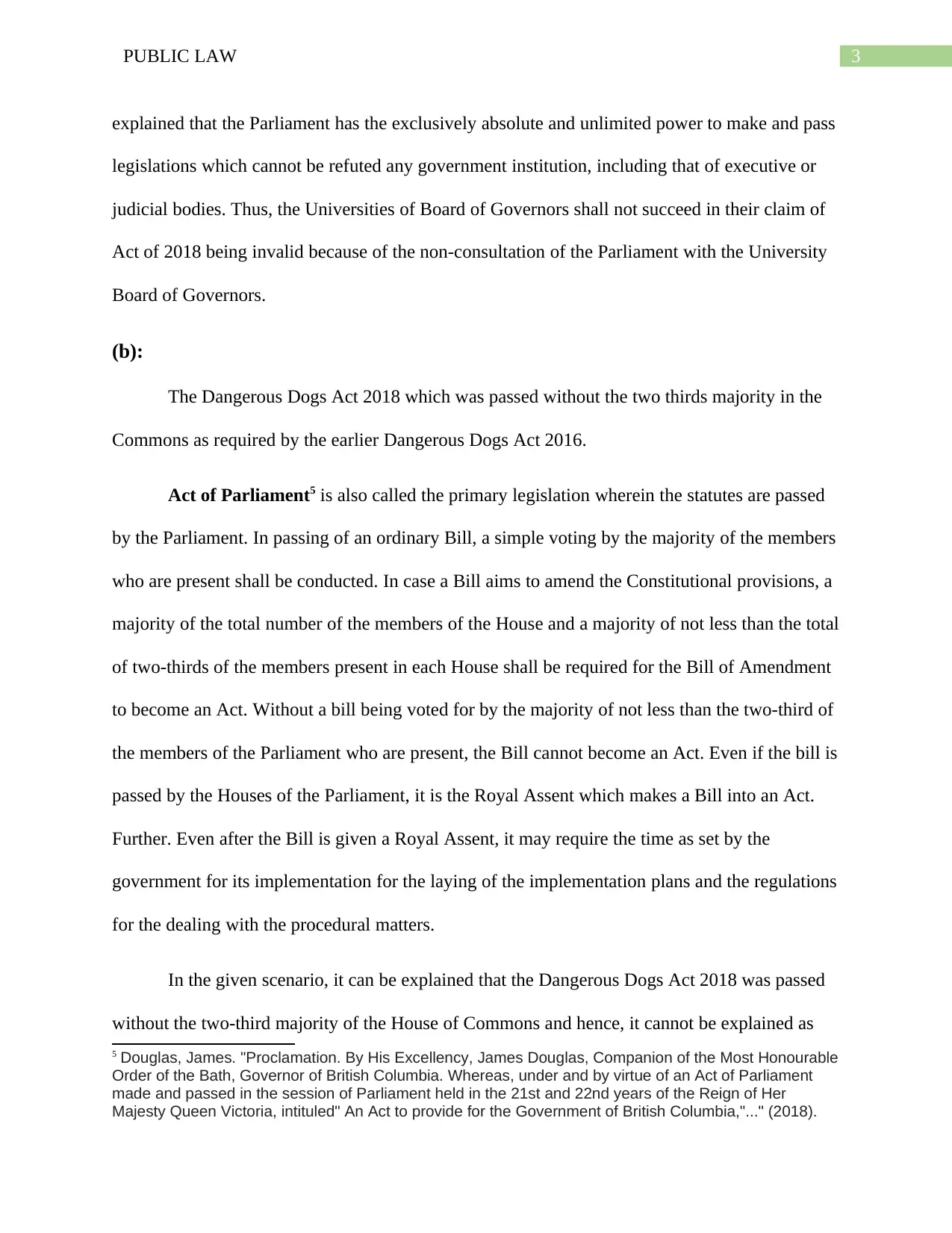
3PUBLIC LAW
explained that the Parliament has the exclusively absolute and unlimited power to make and pass
legislations which cannot be refuted any government institution, including that of executive or
judicial bodies. Thus, the Universities of Board of Governors shall not succeed in their claim of
Act of 2018 being invalid because of the non-consultation of the Parliament with the University
Board of Governors.
(b):
The Dangerous Dogs Act 2018 which was passed without the two thirds majority in the
Commons as required by the earlier Dangerous Dogs Act 2016.
Act of Parliament5 is also called the primary legislation wherein the statutes are passed
by the Parliament. In passing of an ordinary Bill, a simple voting by the majority of the members
who are present shall be conducted. In case a Bill aims to amend the Constitutional provisions, a
majority of the total number of the members of the House and a majority of not less than the total
of two-thirds of the members present in each House shall be required for the Bill of Amendment
to become an Act. Without a bill being voted for by the majority of not less than the two-third of
the members of the Parliament who are present, the Bill cannot become an Act. Even if the bill is
passed by the Houses of the Parliament, it is the Royal Assent which makes a Bill into an Act.
Further. Even after the Bill is given a Royal Assent, it may require the time as set by the
government for its implementation for the laying of the implementation plans and the regulations
for the dealing with the procedural matters.
In the given scenario, it can be explained that the Dangerous Dogs Act 2018 was passed
without the two-third majority of the House of Commons and hence, it cannot be explained as
5 Douglas, James. "Proclamation. By His Excellency, James Douglas, Companion of the Most Honourable
Order of the Bath, Governor of British Columbia. Whereas, under and by virtue of an Act of Parliament
made and passed in the session of Parliament held in the 21st and 22nd years of the Reign of Her
Majesty Queen Victoria, intituled" An Act to provide for the Government of British Columbia,"..." (2018).
explained that the Parliament has the exclusively absolute and unlimited power to make and pass
legislations which cannot be refuted any government institution, including that of executive or
judicial bodies. Thus, the Universities of Board of Governors shall not succeed in their claim of
Act of 2018 being invalid because of the non-consultation of the Parliament with the University
Board of Governors.
(b):
The Dangerous Dogs Act 2018 which was passed without the two thirds majority in the
Commons as required by the earlier Dangerous Dogs Act 2016.
Act of Parliament5 is also called the primary legislation wherein the statutes are passed
by the Parliament. In passing of an ordinary Bill, a simple voting by the majority of the members
who are present shall be conducted. In case a Bill aims to amend the Constitutional provisions, a
majority of the total number of the members of the House and a majority of not less than the total
of two-thirds of the members present in each House shall be required for the Bill of Amendment
to become an Act. Without a bill being voted for by the majority of not less than the two-third of
the members of the Parliament who are present, the Bill cannot become an Act. Even if the bill is
passed by the Houses of the Parliament, it is the Royal Assent which makes a Bill into an Act.
Further. Even after the Bill is given a Royal Assent, it may require the time as set by the
government for its implementation for the laying of the implementation plans and the regulations
for the dealing with the procedural matters.
In the given scenario, it can be explained that the Dangerous Dogs Act 2018 was passed
without the two-third majority of the House of Commons and hence, it cannot be explained as
5 Douglas, James. "Proclamation. By His Excellency, James Douglas, Companion of the Most Honourable
Order of the Bath, Governor of British Columbia. Whereas, under and by virtue of an Act of Parliament
made and passed in the session of Parliament held in the 21st and 22nd years of the Reign of Her
Majesty Queen Victoria, intituled" An Act to provide for the Government of British Columbia,"..." (2018).
Paraphrase This Document
Need a fresh take? Get an instant paraphrase of this document with our AI Paraphraser
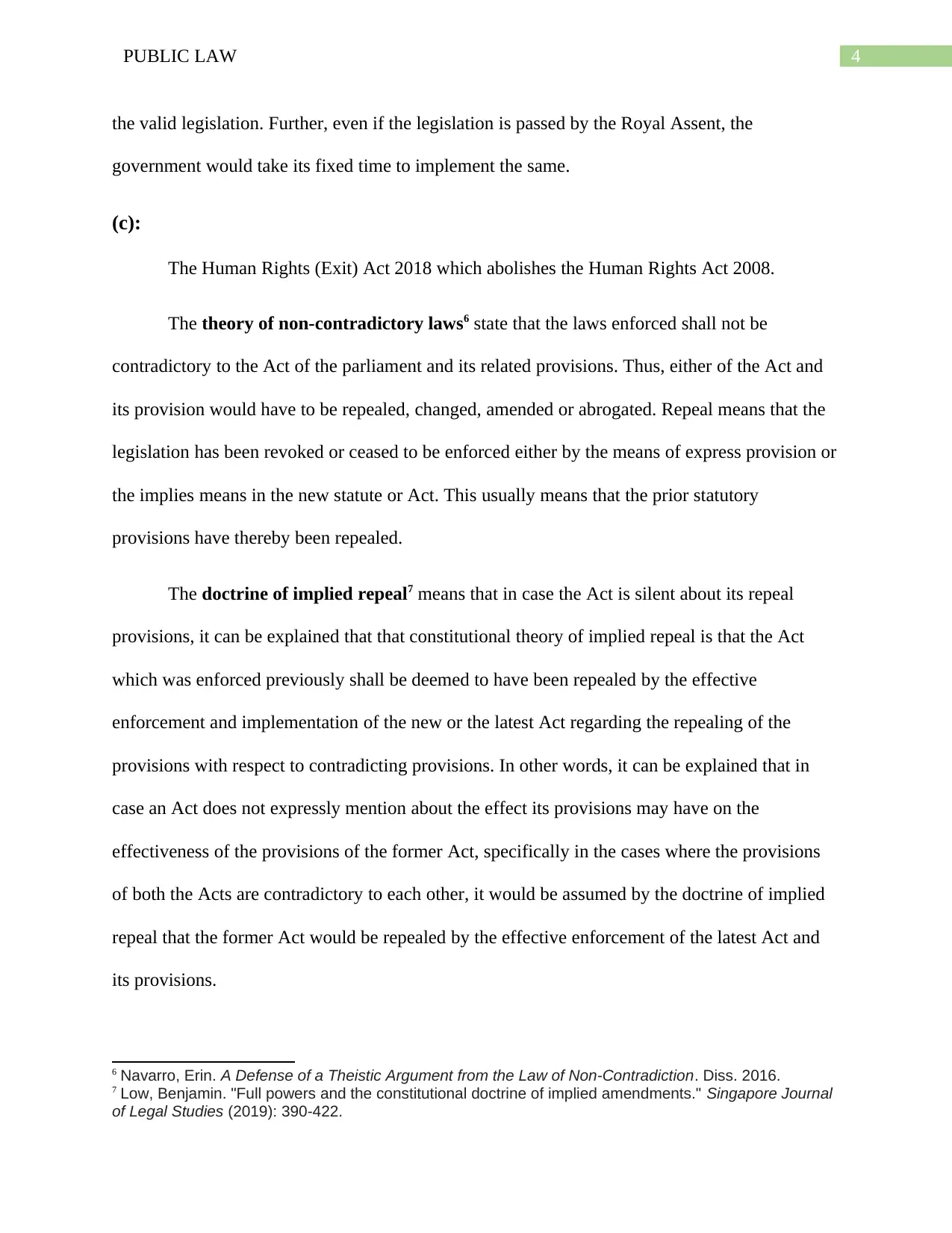
4PUBLIC LAW
the valid legislation. Further, even if the legislation is passed by the Royal Assent, the
government would take its fixed time to implement the same.
(c):
The Human Rights (Exit) Act 2018 which abolishes the Human Rights Act 2008.
The theory of non-contradictory laws6 state that the laws enforced shall not be
contradictory to the Act of the parliament and its related provisions. Thus, either of the Act and
its provision would have to be repealed, changed, amended or abrogated. Repeal means that the
legislation has been revoked or ceased to be enforced either by the means of express provision or
the implies means in the new statute or Act. This usually means that the prior statutory
provisions have thereby been repealed.
The doctrine of implied repeal7 means that in case the Act is silent about its repeal
provisions, it can be explained that that constitutional theory of implied repeal is that the Act
which was enforced previously shall be deemed to have been repealed by the effective
enforcement and implementation of the new or the latest Act regarding the repealing of the
provisions with respect to contradicting provisions. In other words, it can be explained that in
case an Act does not expressly mention about the effect its provisions may have on the
effectiveness of the provisions of the former Act, specifically in the cases where the provisions
of both the Acts are contradictory to each other, it would be assumed by the doctrine of implied
repeal that the former Act would be repealed by the effective enforcement of the latest Act and
its provisions.
6 Navarro, Erin. A Defense of a Theistic Argument from the Law of Non-Contradiction. Diss. 2016.
7 Low, Benjamin. "Full powers and the constitutional doctrine of implied amendments." Singapore Journal
of Legal Studies (2019): 390-422.
the valid legislation. Further, even if the legislation is passed by the Royal Assent, the
government would take its fixed time to implement the same.
(c):
The Human Rights (Exit) Act 2018 which abolishes the Human Rights Act 2008.
The theory of non-contradictory laws6 state that the laws enforced shall not be
contradictory to the Act of the parliament and its related provisions. Thus, either of the Act and
its provision would have to be repealed, changed, amended or abrogated. Repeal means that the
legislation has been revoked or ceased to be enforced either by the means of express provision or
the implies means in the new statute or Act. This usually means that the prior statutory
provisions have thereby been repealed.
The doctrine of implied repeal7 means that in case the Act is silent about its repeal
provisions, it can be explained that that constitutional theory of implied repeal is that the Act
which was enforced previously shall be deemed to have been repealed by the effective
enforcement and implementation of the new or the latest Act regarding the repealing of the
provisions with respect to contradicting provisions. In other words, it can be explained that in
case an Act does not expressly mention about the effect its provisions may have on the
effectiveness of the provisions of the former Act, specifically in the cases where the provisions
of both the Acts are contradictory to each other, it would be assumed by the doctrine of implied
repeal that the former Act would be repealed by the effective enforcement of the latest Act and
its provisions.
6 Navarro, Erin. A Defense of a Theistic Argument from the Law of Non-Contradiction. Diss. 2016.
7 Low, Benjamin. "Full powers and the constitutional doctrine of implied amendments." Singapore Journal
of Legal Studies (2019): 390-422.
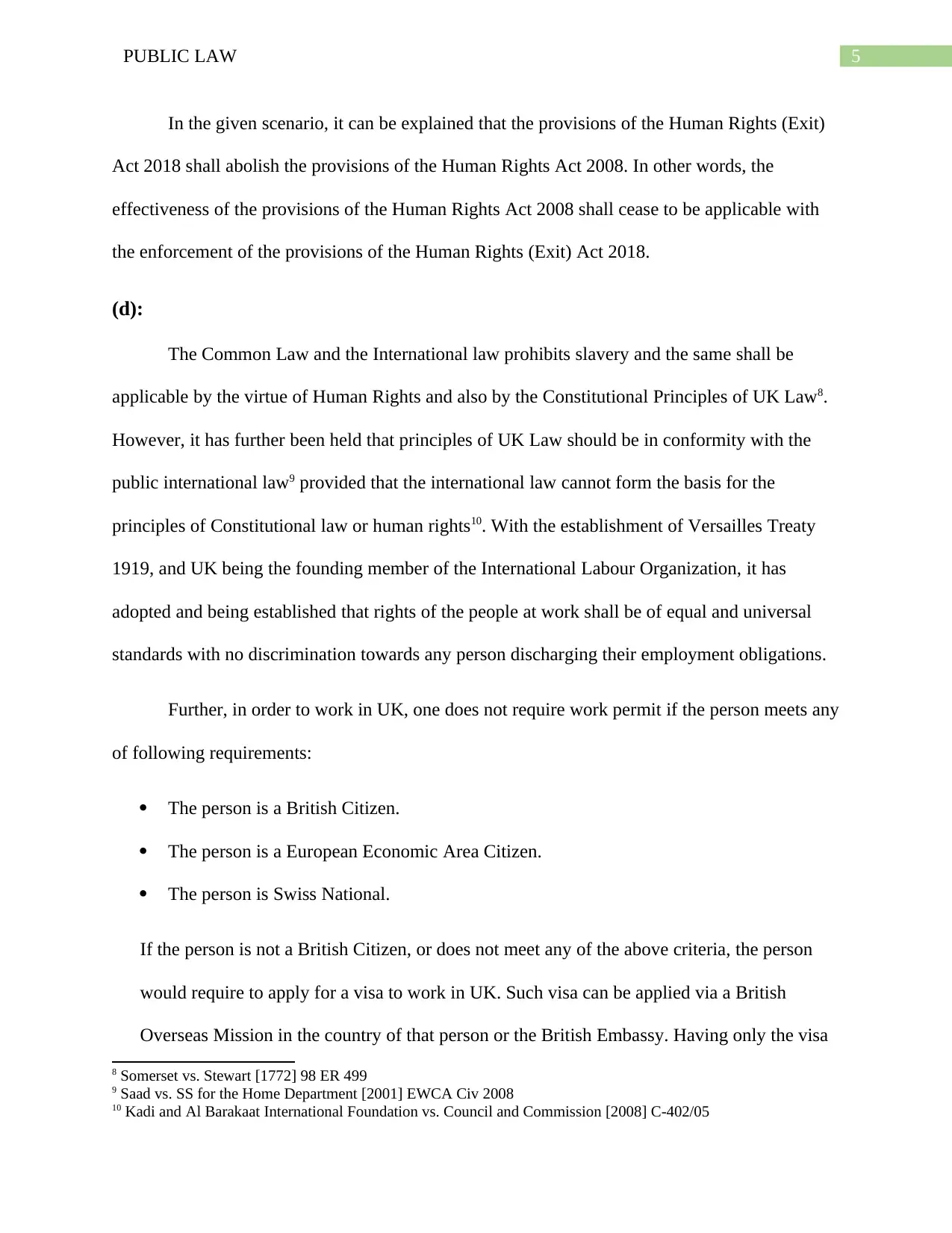
5PUBLIC LAW
In the given scenario, it can be explained that the provisions of the Human Rights (Exit)
Act 2018 shall abolish the provisions of the Human Rights Act 2008. In other words, the
effectiveness of the provisions of the Human Rights Act 2008 shall cease to be applicable with
the enforcement of the provisions of the Human Rights (Exit) Act 2018.
(d):
The Common Law and the International law prohibits slavery and the same shall be
applicable by the virtue of Human Rights and also by the Constitutional Principles of UK Law8.
However, it has further been held that principles of UK Law should be in conformity with the
public international law9 provided that the international law cannot form the basis for the
principles of Constitutional law or human rights10. With the establishment of Versailles Treaty
1919, and UK being the founding member of the International Labour Organization, it has
adopted and being established that rights of the people at work shall be of equal and universal
standards with no discrimination towards any person discharging their employment obligations.
Further, in order to work in UK, one does not require work permit if the person meets any
of following requirements:
The person is a British Citizen.
The person is a European Economic Area Citizen.
The person is Swiss National.
If the person is not a British Citizen, or does not meet any of the above criteria, the person
would require to apply for a visa to work in UK. Such visa can be applied via a British
Overseas Mission in the country of that person or the British Embassy. Having only the visa
8 Somerset vs. Stewart [1772] 98 ER 499
9 Saad vs. SS for the Home Department [2001] EWCA Civ 2008
10 Kadi and Al Barakaat International Foundation vs. Council and Commission [2008] C-402/05
In the given scenario, it can be explained that the provisions of the Human Rights (Exit)
Act 2018 shall abolish the provisions of the Human Rights Act 2008. In other words, the
effectiveness of the provisions of the Human Rights Act 2008 shall cease to be applicable with
the enforcement of the provisions of the Human Rights (Exit) Act 2018.
(d):
The Common Law and the International law prohibits slavery and the same shall be
applicable by the virtue of Human Rights and also by the Constitutional Principles of UK Law8.
However, it has further been held that principles of UK Law should be in conformity with the
public international law9 provided that the international law cannot form the basis for the
principles of Constitutional law or human rights10. With the establishment of Versailles Treaty
1919, and UK being the founding member of the International Labour Organization, it has
adopted and being established that rights of the people at work shall be of equal and universal
standards with no discrimination towards any person discharging their employment obligations.
Further, in order to work in UK, one does not require work permit if the person meets any
of following requirements:
The person is a British Citizen.
The person is a European Economic Area Citizen.
The person is Swiss National.
If the person is not a British Citizen, or does not meet any of the above criteria, the person
would require to apply for a visa to work in UK. Such visa can be applied via a British
Overseas Mission in the country of that person or the British Embassy. Having only the visa
8 Somerset vs. Stewart [1772] 98 ER 499
9 Saad vs. SS for the Home Department [2001] EWCA Civ 2008
10 Kadi and Al Barakaat International Foundation vs. Council and Commission [2008] C-402/05
⊘ This is a preview!⊘
Do you want full access?
Subscribe today to unlock all pages.

Trusted by 1+ million students worldwide
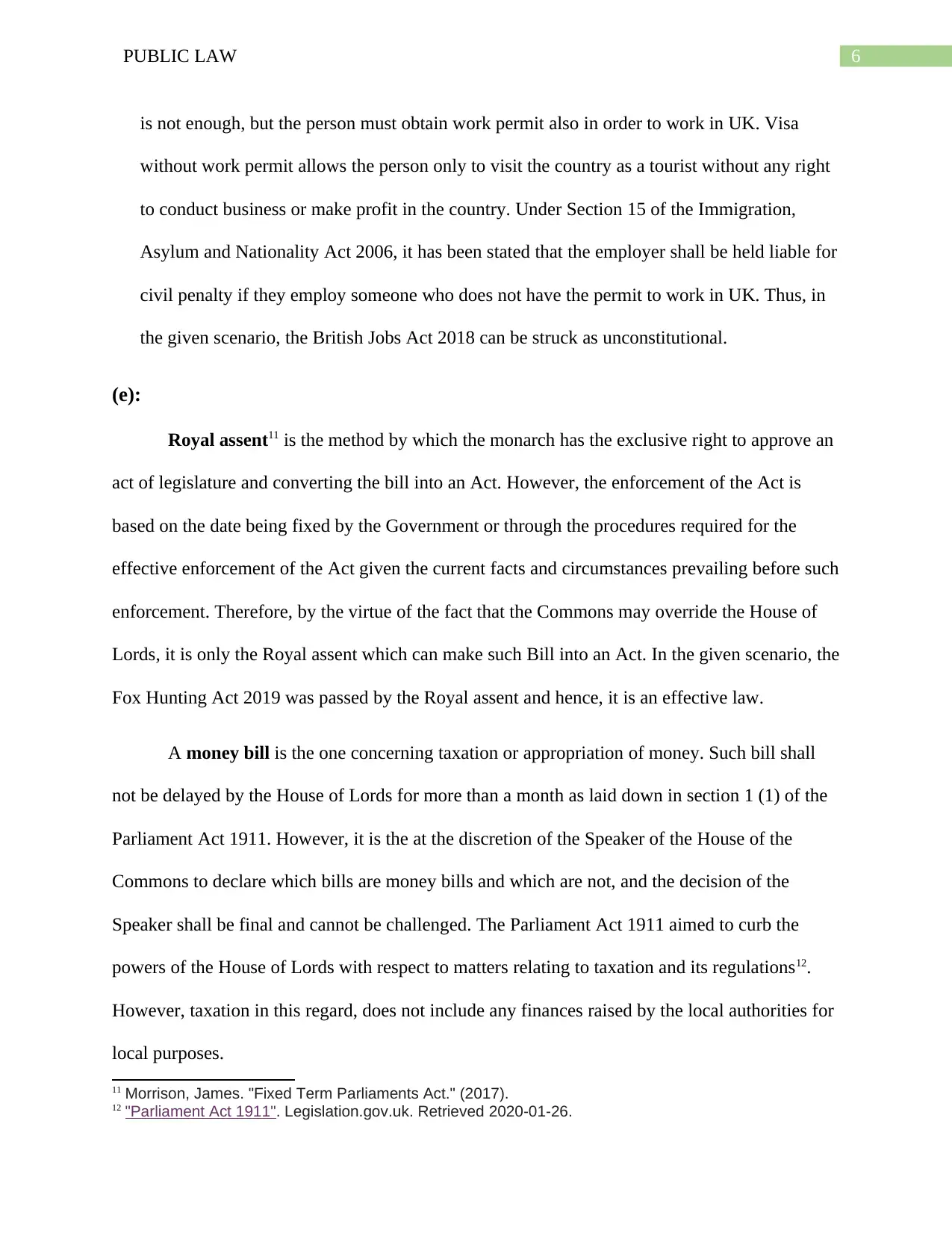
6PUBLIC LAW
is not enough, but the person must obtain work permit also in order to work in UK. Visa
without work permit allows the person only to visit the country as a tourist without any right
to conduct business or make profit in the country. Under Section 15 of the Immigration,
Asylum and Nationality Act 2006, it has been stated that the employer shall be held liable for
civil penalty if they employ someone who does not have the permit to work in UK. Thus, in
the given scenario, the British Jobs Act 2018 can be struck as unconstitutional.
(e):
Royal assent11 is the method by which the monarch has the exclusive right to approve an
act of legislature and converting the bill into an Act. However, the enforcement of the Act is
based on the date being fixed by the Government or through the procedures required for the
effective enforcement of the Act given the current facts and circumstances prevailing before such
enforcement. Therefore, by the virtue of the fact that the Commons may override the House of
Lords, it is only the Royal assent which can make such Bill into an Act. In the given scenario, the
Fox Hunting Act 2019 was passed by the Royal assent and hence, it is an effective law.
A money bill is the one concerning taxation or appropriation of money. Such bill shall
not be delayed by the House of Lords for more than a month as laid down in section 1 (1) of the
Parliament Act 1911. However, it is the at the discretion of the Speaker of the House of the
Commons to declare which bills are money bills and which are not, and the decision of the
Speaker shall be final and cannot be challenged. The Parliament Act 1911 aimed to curb the
powers of the House of Lords with respect to matters relating to taxation and its regulations12.
However, taxation in this regard, does not include any finances raised by the local authorities for
local purposes.
11 Morrison, James. "Fixed Term Parliaments Act." (2017).
12 "Parliament Act 1911". Legislation.gov.uk. Retrieved 2020-01-26.
is not enough, but the person must obtain work permit also in order to work in UK. Visa
without work permit allows the person only to visit the country as a tourist without any right
to conduct business or make profit in the country. Under Section 15 of the Immigration,
Asylum and Nationality Act 2006, it has been stated that the employer shall be held liable for
civil penalty if they employ someone who does not have the permit to work in UK. Thus, in
the given scenario, the British Jobs Act 2018 can be struck as unconstitutional.
(e):
Royal assent11 is the method by which the monarch has the exclusive right to approve an
act of legislature and converting the bill into an Act. However, the enforcement of the Act is
based on the date being fixed by the Government or through the procedures required for the
effective enforcement of the Act given the current facts and circumstances prevailing before such
enforcement. Therefore, by the virtue of the fact that the Commons may override the House of
Lords, it is only the Royal assent which can make such Bill into an Act. In the given scenario, the
Fox Hunting Act 2019 was passed by the Royal assent and hence, it is an effective law.
A money bill is the one concerning taxation or appropriation of money. Such bill shall
not be delayed by the House of Lords for more than a month as laid down in section 1 (1) of the
Parliament Act 1911. However, it is the at the discretion of the Speaker of the House of the
Commons to declare which bills are money bills and which are not, and the decision of the
Speaker shall be final and cannot be challenged. The Parliament Act 1911 aimed to curb the
powers of the House of Lords with respect to matters relating to taxation and its regulations12.
However, taxation in this regard, does not include any finances raised by the local authorities for
local purposes.
11 Morrison, James. "Fixed Term Parliaments Act." (2017).
12 "Parliament Act 1911". Legislation.gov.uk. Retrieved 2020-01-26.
Paraphrase This Document
Need a fresh take? Get an instant paraphrase of this document with our AI Paraphraser
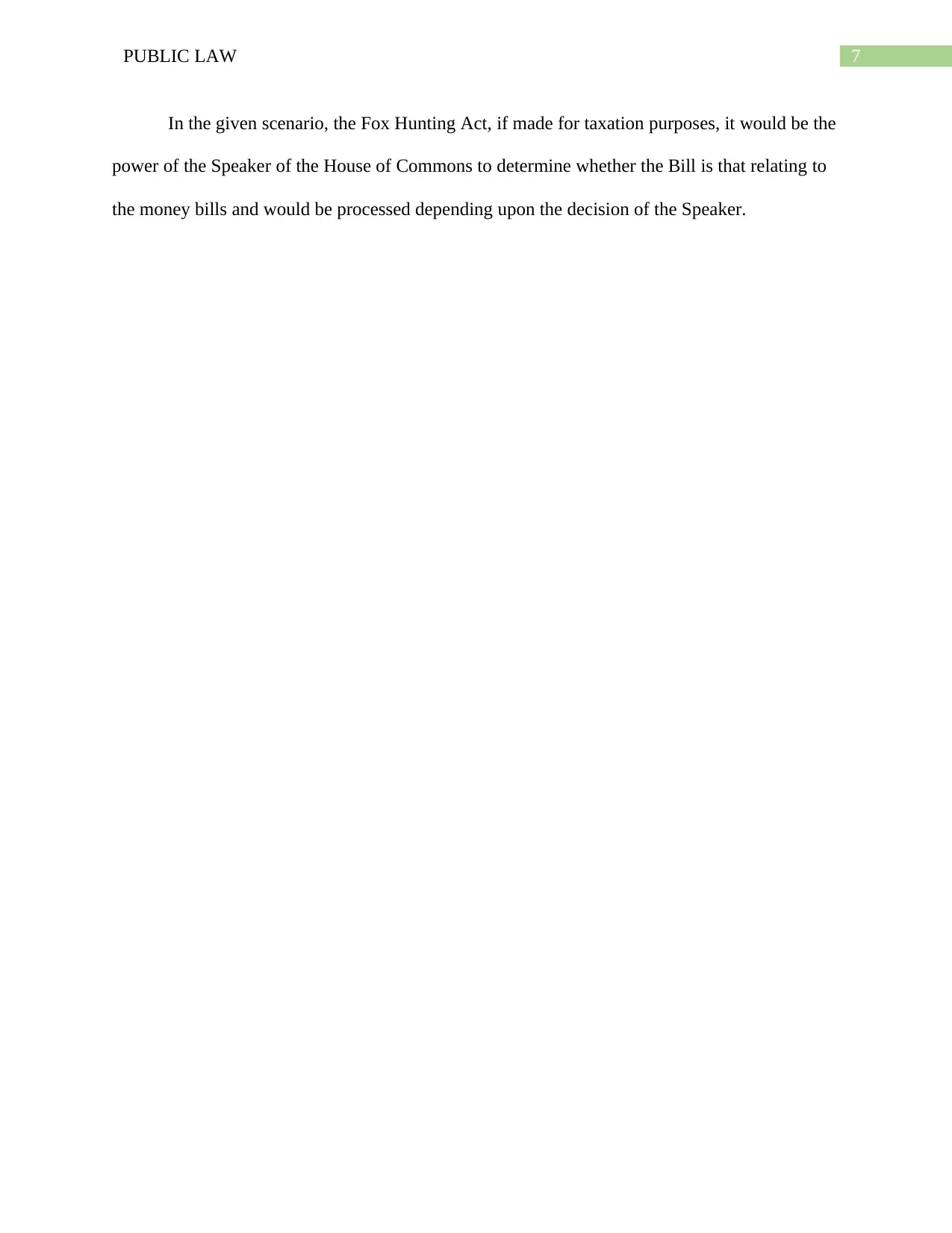
7PUBLIC LAW
In the given scenario, the Fox Hunting Act, if made for taxation purposes, it would be the
power of the Speaker of the House of Commons to determine whether the Bill is that relating to
the money bills and would be processed depending upon the decision of the Speaker.
In the given scenario, the Fox Hunting Act, if made for taxation purposes, it would be the
power of the Speaker of the House of Commons to determine whether the Bill is that relating to
the money bills and would be processed depending upon the decision of the Speaker.
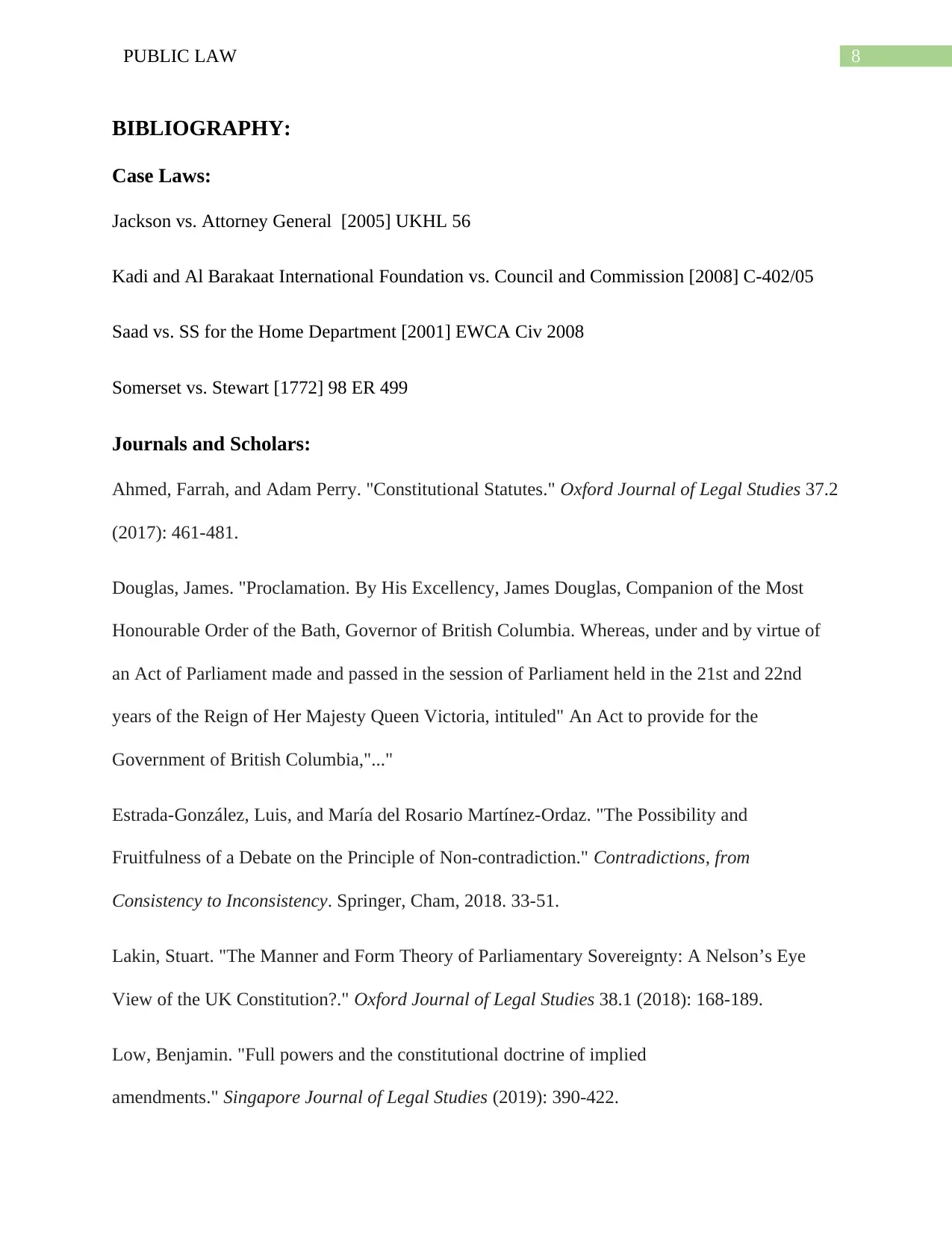
8PUBLIC LAW
BIBLIOGRAPHY:
Case Laws:
Jackson vs. Attorney General [2005] UKHL 56
Kadi and Al Barakaat International Foundation vs. Council and Commission [2008] C-402/05
Saad vs. SS for the Home Department [2001] EWCA Civ 2008
Somerset vs. Stewart [1772] 98 ER 499
Journals and Scholars:
Ahmed, Farrah, and Adam Perry. "Constitutional Statutes." Oxford Journal of Legal Studies 37.2
(2017): 461-481.
Douglas, James. "Proclamation. By His Excellency, James Douglas, Companion of the Most
Honourable Order of the Bath, Governor of British Columbia. Whereas, under and by virtue of
an Act of Parliament made and passed in the session of Parliament held in the 21st and 22nd
years of the Reign of Her Majesty Queen Victoria, intituled" An Act to provide for the
Government of British Columbia,"..."
Estrada-González, Luis, and María del Rosario Martínez-Ordaz. "The Possibility and
Fruitfulness of a Debate on the Principle of Non-contradiction." Contradictions, from
Consistency to Inconsistency. Springer, Cham, 2018. 33-51.
Lakin, Stuart. "The Manner and Form Theory of Parliamentary Sovereignty: A Nelson’s Eye
View of the UK Constitution?." Oxford Journal of Legal Studies 38.1 (2018): 168-189.
Low, Benjamin. "Full powers and the constitutional doctrine of implied
amendments." Singapore Journal of Legal Studies (2019): 390-422.
BIBLIOGRAPHY:
Case Laws:
Jackson vs. Attorney General [2005] UKHL 56
Kadi and Al Barakaat International Foundation vs. Council and Commission [2008] C-402/05
Saad vs. SS for the Home Department [2001] EWCA Civ 2008
Somerset vs. Stewart [1772] 98 ER 499
Journals and Scholars:
Ahmed, Farrah, and Adam Perry. "Constitutional Statutes." Oxford Journal of Legal Studies 37.2
(2017): 461-481.
Douglas, James. "Proclamation. By His Excellency, James Douglas, Companion of the Most
Honourable Order of the Bath, Governor of British Columbia. Whereas, under and by virtue of
an Act of Parliament made and passed in the session of Parliament held in the 21st and 22nd
years of the Reign of Her Majesty Queen Victoria, intituled" An Act to provide for the
Government of British Columbia,"..."
Estrada-González, Luis, and María del Rosario Martínez-Ordaz. "The Possibility and
Fruitfulness of a Debate on the Principle of Non-contradiction." Contradictions, from
Consistency to Inconsistency. Springer, Cham, 2018. 33-51.
Lakin, Stuart. "The Manner and Form Theory of Parliamentary Sovereignty: A Nelson’s Eye
View of the UK Constitution?." Oxford Journal of Legal Studies 38.1 (2018): 168-189.
Low, Benjamin. "Full powers and the constitutional doctrine of implied
amendments." Singapore Journal of Legal Studies (2019): 390-422.
⊘ This is a preview!⊘
Do you want full access?
Subscribe today to unlock all pages.

Trusted by 1+ million students worldwide
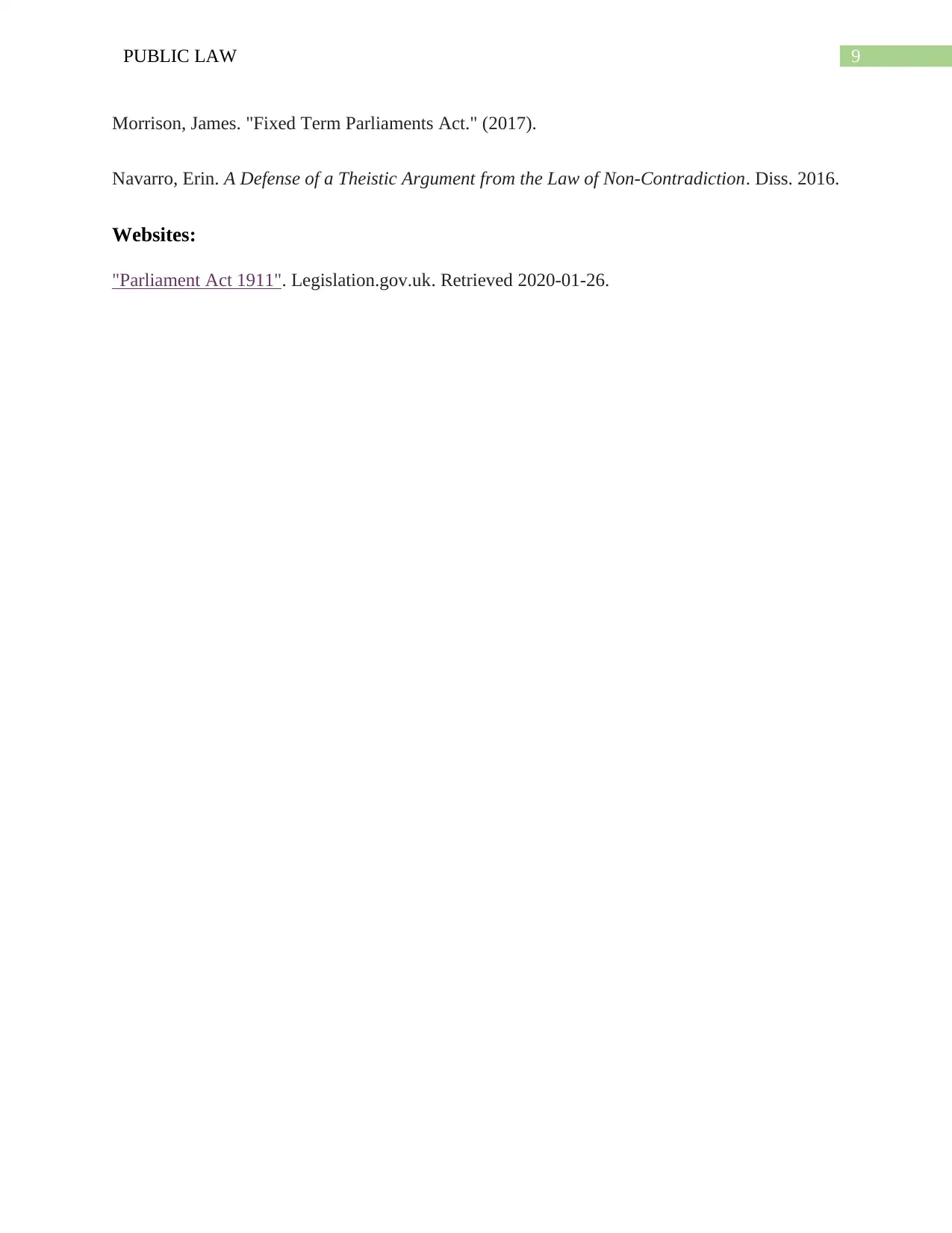
9PUBLIC LAW
Morrison, James. "Fixed Term Parliaments Act." (2017).
Navarro, Erin. A Defense of a Theistic Argument from the Law of Non-Contradiction. Diss. 2016.
Websites:
"Parliament Act 1911". Legislation.gov.uk. Retrieved 2020-01-26.
Morrison, James. "Fixed Term Parliaments Act." (2017).
Navarro, Erin. A Defense of a Theistic Argument from the Law of Non-Contradiction. Diss. 2016.
Websites:
"Parliament Act 1911". Legislation.gov.uk. Retrieved 2020-01-26.
1 out of 10
Related Documents
Your All-in-One AI-Powered Toolkit for Academic Success.
+13062052269
info@desklib.com
Available 24*7 on WhatsApp / Email
![[object Object]](/_next/static/media/star-bottom.7253800d.svg)
Unlock your academic potential
Copyright © 2020–2026 A2Z Services. All Rights Reserved. Developed and managed by ZUCOL.




